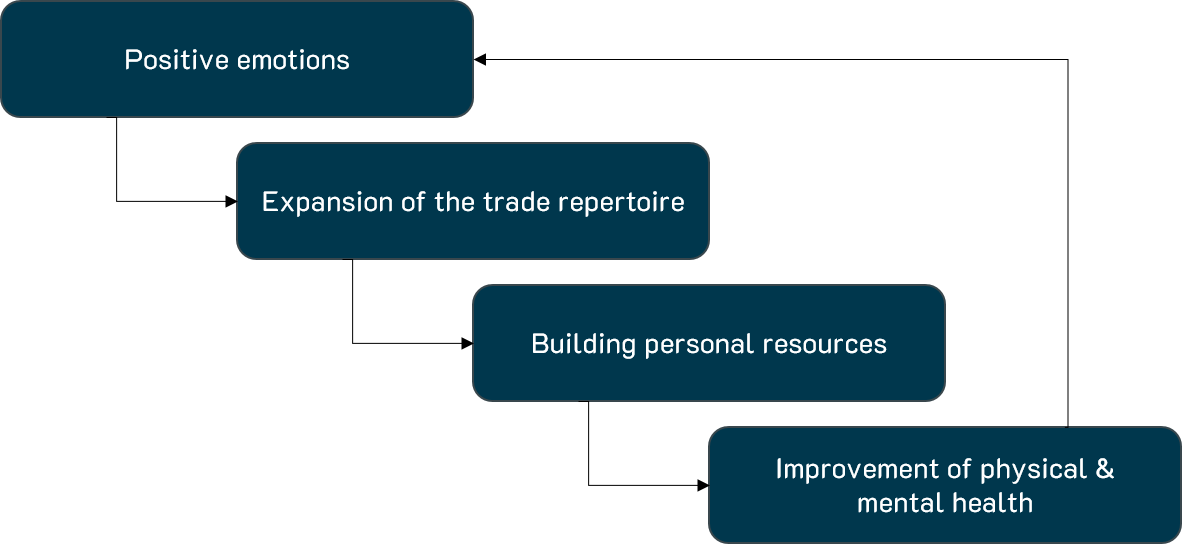
“Build what’s strong instead of fix what’s wrong”.
One of the most important theoretical foundations in positive psychology is the self-determination theory, in which people are seen as active organisms oriented towards growth and change. Because - so the argument goes - this also has an evolutionary advantage for survival. A major field of action, which is also applied in the world of work, is then also a solution- or resource-oriented approach (as opposed to a problem-oriented focus). Thus, a much-quoted phrase by Martin Seligman, one of the leading figures in positive psychology, is also "Build what's strong instead of fix what's wrong".
Currently, "putting out fires", i.e. solving short-term problems, often gets so much space in the daily work routine that future possibilities cannot even be explored, let alone exhausted. This short-sighted perspective often leads to a feeling of hopelessness and insecurity among employees.
On the other hand, being aware of and focusing on existing resources and solutions also improves the emotional state of employees and helps them to flourish - one of the main tenets of positive psychology. This has several welcome effects, because positive emotions lead to an expansion of our repertoire of actions, make us see the big picture better and stimulate people to be more likely to take a risk and try and/or learn something new. Best of all, along with the increase in positive emotions, a positive upward spiral is set in motion in which all components reinforce each other (summarised in B. Fredrickson's Broaden-and-Build Theory). This beneficial effect is also confirmed by studies that show that successful companies focus their resources on systematically building strengths rather than avoiding problems.

Pain is inevitable or „Never waste a good crisis“ (W. Churchill)
As mentioned at the beginning, the goal of positive psychology is not to focus one-sidedly on the "nice" things in life. Just as it is important to enjoy the good days, it is important to consciously perceive "negative" states. We all know the saying "Without shadow there is no light". It is the same with our well-being. Only if we also know the dark sides of life, we know how to appreciate the beautiful days. In addition, it is important to recognise when one is dissatisfied. Only then is it possible to take a closer look at the situation and (solution-oriented) change something about it. This applies to individuals as well as to larger communities.
Especially in the current Covid period, many people are noticing first-hand that - no matter how exhausting and energy-sapping the crisis is - it helps us to grow. We get to know ourselves and others in a whole new way. And the external circumstances force us to try new things. Once the threat is gone, some of our behaviour will revert to old, more rewarding ways. But some will be permanently incorporated into our repertoire of actions. For example, if it is more efficient or more pleasant than our old behaviour. We have grown from the crisis.
"The safest place for a ship is the harbour. But that is not what ships are made for." (Albert Einstein)
Just as ships are not built for safe harbour, organisations are not made to stay put. True to the principle of "survival of the fittest", growth and change are essential for organisations to remain competitive.
How can a company use the findings of positive psychology in its change projects? There are many starting points here. One of the most important is certainly to take stock - this is already done in many projects. What is often neglected in this initial analysis phase, however, is a conscious examination of the strengths and competences of the individual team members or stakeholders. On the one hand, this prevents the individual team members from getting into a state of flourishing, and on the other hand, valuable resources are lost. A suitable measure for this is, for example, the Appreciative Inquiry Method, based on the principle: "We develop towards what we focus on".
Would you like to make your change project successful and, among other things, incorporate the change knowledge derived from positive psychology? Please contact us. We look forward to exchanging ideas with you.
Your Organisational Change Team at Munich Consulting Group.
• Cameron & Dutton, 2003
• Bohlmijer, Bolier, Westerhof & Walburg, 2015
• ZUPO - Fachbereich Zukunftsmanagement und Positiver Wandel der Universität Trier

